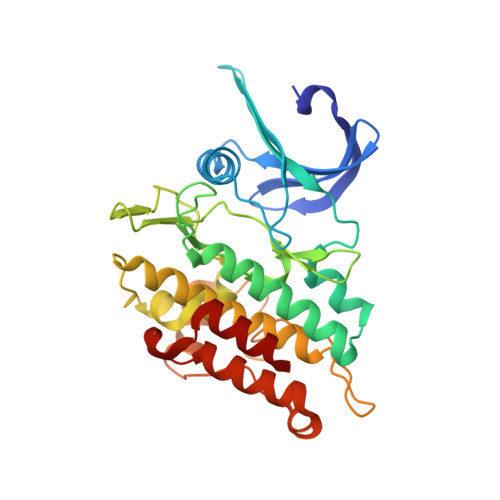Structure-Activity Relationship of 3,5-Diaryl-2-Aminopyridine Alk2 Inhibitors Reveals Unaltered Binding Affinity for Fibrodysplasia Ossificans Progressiva Causing Mutants.
Mohedas, A.H., Wang, Y., Sanvitale, C.E., Canning, P., Choi, S., Xing, X., Bullock, A.N., Cuny, G.D., Yu, P.B.(2014) J Med Chem 57: 7900
- PubMed: 25101911
- DOI: https://doi.org/10.1021/jm501177w
- Primary Citation of Related Structures:
4BGG - PubMed Abstract:
There are currently no effective therapies for fibrodysplasia ossificans progressiva (FOP), a debilitating and progressive heterotopic ossification disease caused by activating mutations of ACVR1 encoding the BMP type I receptor kinase ALK2. Recently, a subset of these same mutations of ACVR1 have been identified in diffuse intrinsic pontine glioma (DIPG) tumors. Here we describe the structure-activity relationship for a series of novel ALK2 inhibitors based on the 2-aminopyridine compound K02288. Several modifications increased potency in kinase, thermal shift, or cell-based assays of BMP signaling and transcription, as well as selectivity for ALK2 versus closely related BMP and TGF-β type I receptor kinases. Compounds in this series exhibited a wide range of in vitro cytotoxicity that was not correlated with potency or selectivity, suggesting mechanisms independent of BMP or TGF-β inhibition. The study also highlights a potent 2-methylpyridine derivative 10 (LDN-214117) with a high degree of selectivity for ALK2 and low cytotoxicity that could provide a template for preclinical development. Contrary to the notion that activating mutations of ALK2 might alter inhibitor efficacy due to potential conformational changes in the ATP-binding site, the compounds demonstrated consistent binding to a panel of mutant and wild-type ALK2 proteins. Thus, BMP inhibitors identified via activity against wild-type ALK2 signaling are likely to be of clinical relevance for the diverse ALK2 mutant proteins associated with FOP and DIPG.
Organizational Affiliation:
Harvard-MIT Division of Health Sciences and Technology, Massachusetts Institute of Technology , 77 Massachusetts Avenue, Cambridge, Massachusetts 02139, United States.

















